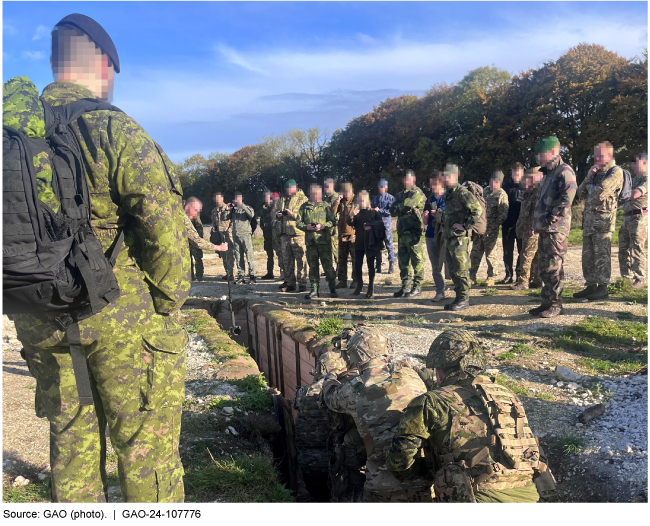Ukraine: DOD Could Strengthen International Military Training Coordination by Improving Data Quality
Fast Facts
This report examines U.S. coordination with other countries on military training provided to Ukrainian forces outside Ukraine. This is one of many GAO reports on U.S. aid to Ukraine following Russia's full-scale invasion in February 2022.
We found that over 30 countries helped train about 116,000 Ukrainians outside Ukraine as of Feb. 2024. The U.S. trained about 16% of them. As of May, the number trained had grown to about 127,000.
The U.S. collects data on this training, but we found that it was sometimes incomplete or inconsistent. We recommended clarifying U.S. training data guidance to help make the data more useful.

Highlights
What GAO Found
DOD’s Office of the Secretary of Defense and the U.S. European Command (EUCOM), through the Security Assistance Group-Ukraine (SAG-U), coordinate international military training for Ukraine with the Ukraine Defense Contact Group, other multinational groups, and individual countries. According to SAG-U data, during the first 2 years of the war following Russia’s full-scale invasion (February 24, 2022–February 23, 2024), more than 30 countries helped train about 116,000 Ukrainians at training sites located outside of Ukraine. The U.S. provided training to about 16 percent of this total. As of May 17, 2024, the total number of Ukrainians trained outside Ukraine had increased to about 127,000, according to DOD officials.
Ukraine Training Demonstration in the United Kingdom, October 2023

The overall numbers of Ukrainians trained outside of Ukraine increased substantially from the first to the second year of the war, with particularly significant increases in collective training (i.e., to develop proficiency in group operations) and leadership training, according to SAG-U data.
SAG-U collects training data from the U.S. military, multinational groups, and allied or partner nations on a training tracker spreadsheet and uses the data to show a comprehensive picture of U.S., allied, and partner nation military training contributions outside of Ukraine. Although GAO found SAG-U’s training data sufficiently reliable to report broad trends in the number of Ukrainians that completed military training outside of Ukraine, GAO found that the spreadsheet has some limitations, such as blank and inconsistently labeled data fields, that make more specific types of analyses difficult. Without collecting quality data that is organized in a systematic way, SAG-U cannot ensure consistent and complete tracking of the training that the U.S., allies, and partner nations provide to inform decisions about Ukraine’s future training needs.
GAO also identified key challenges to providing international military training outside of Ukraine. Some key challenges related to training design, such as insufficient time for training and lack of standardized content and support. Other key challenges involved administrative problems with personnel, scheduling, equipment, and logistics. To address these key challenges, SAG-U has taken steps such as establishing training directives to help standardize delivery of training and collecting end-of-training reports to share lessons learned.
Why GAO Did This Study
Since Russia’s 2014 invasion of the Crimea region of Ukraine and its 2022 full-scale invasion of other areas of the country, the Government of Ukraine has undertaken significant efforts to develop its security forces to defend itself and retake its internationally-recognized territory. In support of these efforts, the U.S., primarily through the Departments of Defense (DOD) and State, has committed more than $55 billion in security assistance, including both training and defense articles, since the full-scale war began, according to DOD.
The Additional Ukraine Supplemental Appropriations Act, 2023, includes a provision for GAO to conduct oversight, including audits and investigations, of amounts appropriated in response to the war-related situation in Ukraine. This review examines DOD’s coordination with the Government of Ukraine, allies, and partner nations on military training that has occurred outside of Ukraine in the first 2 years of the full-scale war. This report is a public version of a sensitive report GAO issued in July 2024 (see GAO-24-106964SU). DOD deemed some of the data and information in GAO’s July report to be sensitive and in need of protection from public disclosure. Therefore, this report omits that data and information. This report is part of a series of reports that GAO has underway or has recently issued that evaluate U.S. agencies’ security assistance programs in response to the war in Ukraine.
For this report, GAO reviewed documents and interviewed officials working for DOD, State, allies, and partner nations. GAO analyzed SAG-U training data by organization, nation, and host country and attended a SAG-U Joint Training Conference in Germany and a multinational group’s training symposium in the United Kingdom.
Recommendations
GAO recommends that DOD establish clear written guidance defining the terms and variables for all data entered into the SAG-U system of record for tracking the provision of international military training to Ukraine.
Recommendations for Executive Action
| Agency Affected | Recommendation | Status |
|---|---|---|
| Department of Defense | The Secretary of Defense should ensure that the Commander of EUCOM establishes clear written guidance defining the terms and variables for all data entered into the SAG-U training system of record for tracking the provision of international military training to Ukraine. (Recommendation 1) |
When we confirm what actions the agency has taken in response to this recommendation, we will provide updated information.
|
